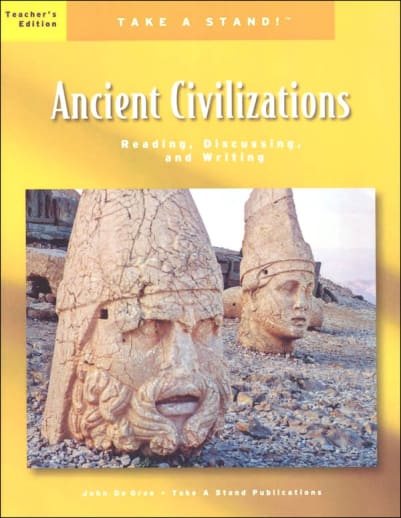The Teacher Edition (2017) has been expanded, re-organized, and rewritten. It contains a teacher's introduction which includes an explanation of the classical approach to history and teaching the Socratic method. The complete student book is included with answers filled in. Although the answer key is probably necessary, the real value in this manual is the teacher's introductory information. There's so much useful information here! Starting with a brief introduction to the nature of the Take a Stand! courses, the "how to use" portion takes the teacher/writing mentor step-by-step through the process. Included is how to schedule the lessons and an explanation of each step in the process, plus a wonderful section on grading the essays along with suggestions for making this easy on yourself. (Hint: you don't have to grade the whole essay with every assignment; sometimes you can grade just the thesis statement, or the evidence used or the conclusion.) The author provides an "explained grading rubric" (i.e. what does a score of 4 mean) as well as the different categories that should be graded (i.e. thesis, evidence used, evidence explained, conclusion, and pre-writing activities). Since it helps to have examples when you're just learning how to grade certain types of essays/papers, the author kindly provides multiple samples along with grading notes for each. He also provides examples of one-, three-, and five-paragraph essays. A nice plus is that although the general information in each of the TEs is similar, the author has fully adapted each to the specific course, including the sample essays.Teacher editions tend to be 80-90 pgs, pb.
Take a Stand! Ancient Civilizations Teacher's Edition
Description
The Take a Stand! Series teaches students how to be historians. They learn not only basic facts of history, but how to analyze the events of the past. This unique approach makes the student an active participation in the analysis of the past. This is the best of critical thinking, Socratic discussion, and analytical writing in history. The Take a Stand! series is not a set of textbooks, but rather thinking, reading, speaking, and writing guides. Take a Stand! shows the student how to be a historian. The Teacher Edition contains the Grammar, Logic, and Rhetoric assignments necessary to teaching a student the basic content of history and the thinking skills needed to be an independent thinker in history. Each chapter contains a list of important vocabulary words (Grammar). Interspersed through the history content are thinking skills and open-ended questions (Logic and Rhetoric). The teacher needs to only follow from page 1 and continue to the end. This series has been made with over 20 years of teaching and publishing experience and represents decades of work and practice.
The Teacher Edition guides the teacher in providing weekly lesson plans, complete with exact reading assignments, research, and homework. Following the teacher guide will guarantee the teacher completes all lessons for the year without adding any stress involved in planning lessons. The teacher guide shows the teacher how to use the text (World History Detective), how teach the thinking tools of Take a Stand!, and provides teaching suggestions and ideas in how to get the best out of your student(s).
History Content: Early Human Civilizations, Mesopotamia, Egypt, and Kush, Ancient Hebrews, Judaism, Ancient Greece, Greek Literature and Mythology, Ancient India, Hinduism and Buddhism, Ancient China, Confucianism, The Roman Republic, Christianity
Thinking Skills: Fact or Opinion? Judgment, Supporting Evidence, Primary or Secondary Analysis, Using Quotes, Taking Notes, Analyzing Primary Sources, Cause and Effect, Compare and Contrast
Essay questions on: Early Human Civilizations; Mesopotamia, Egypt, and Kush; Ancient Hebrews; Judaism; Ancient Greece; Greek Literature; Ancient India; Hinduism and Buddhism; Ancient China; Confucianism; Roman Republic; Christianity.
| Product Format: | Paperback |
|---|---|
| Grades: | 6-12 |
| Brand: | Classical Historian |
| ISBN: | 9781093613735 |
| Length in Inches: | 11 |
| Width in Inches: | 8.5 |
| Height in Inches: | 0.25 |
| Weight in Pounds: | 0.7 |

